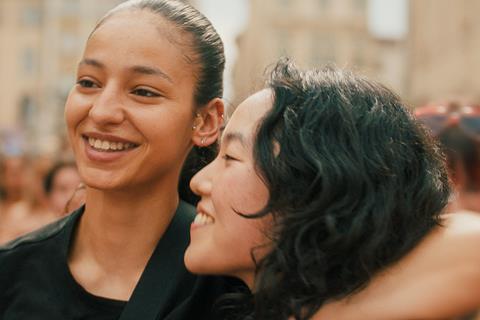
As an actress, Hafsia Herzi burst onto the scene in Abdellatif Kechiche’s The Secret Of The Grain, winning most promising actress at the 2008 César awards and the Marcello Mastroianni prize at Venice.
While she continues to act, and has a starring role in Léa Mysius’s upcoming thriller The Birthday Party, Herzi has also turned her hand to writing and directing. In 2019, her feature directorial debut You Deserve A Lover premiered at Critics’ Week in Cannes, while her follow-up Good Mother bowed two years later in Un Certain Regard, where it won the ensemble acting prize. With her third feature The Little Sister, an adaptation of Fatima Daas’s autobiographical novel The Last One, she graduates to Cannes Competition.
Herzi’s film, the story of a 17-year-old French Algerian woman grappling with her attraction to women, her Muslim faith and society’s expectations, features a mostly non-professional cast led by Nadia Melliti. It is produced by June Films’ Julie Billy and Naomi Denamur in co-production with Arte France Cinéma and Vanessa Ciszewski of Germany’s Katuh Studio; it is sold by mk2 Films.
How did you discover the novel and why did you want to adapt it?
Julie Billy contacted me after seeing my first film. She and Naomi Denamur had the book rights. I’d never adapted a book before and, while I was touched by the story, I thought adapting it would be challenging because it’s written in such a specific way. At the same time, it was about a character I’d never seen before in cinema — a lesbian woman of Muslim origin. I thought many people, particularly women, would relate to this character. The religion is just a minor aspect of a story that is universal.
How would you describe the film’s plot and genre?
It’s a snapshot of life; it’s about a character we follow for a year. I wanted to show what her daily life was like and get into her head. That wasn’t easy to write and it was difficult to convince financiers since so much was based on the direction and in the unsaid — the characters often say so much without saying anything at all.
Did you meet author Fatima Daas and did she participate in adapting her story to the screen?
I’ve always written alone. I need to lock myself inside and work at my own pace. There were other filmmakers on the list to direct, but Fatima chose me. We met and there was instant alchemy. She isn’t very talkative, and neither am I. I didn’t want to disappoint her or her book, so I dived in and did research to make something she would be proud of. Contractually, she didn’t have first-look rights, but I regularly sent her versions of the script for feedback. We talked about it amicably and she was very respectful of my vision.
What did your research entail?
I went to LGBTQ+ parties — we filmed in real bars and clubs in Paris and I spent months interacting with the lesbian community and spoke to many people. I wanted to understand their experiences and feelings, to be sincere and real. [The character of] Fatima knows she is attracted to women but has trouble accepting it.
How did you navigate the intimate scenes, especially working with a mostly non-professional cast? Did you use an intimacy co-ordinator?
From the beginning of the casting process, I spoke to all the actors about the intimate scenes. If they had been uncomfortable about anything, I was ready to adapt the script accordingly. The aim was to make everyone as comfortable as possible. This also meant doing a sort of casting for my crew, both men and women. I tried to choose people who were discreet and respectful so that everyone in front of and behind the cameras would feel at ease. I proposed intimacy co-ordinators, but none of the actresses wanted one and preferred I work with them directly. It was all done in a small group and with a joyful atmosphere.
How does it feel to be playing in Competition?
It has yet to sink in. When I wanted to make films, I dreamed of being in Competition at Cannes. It still makes me laugh reading in the press, “The film is in the running for the Palme d’Or.” I’m a bit scared, but it’s a good scared. It’s the fear of the unknown.

























No comments yet